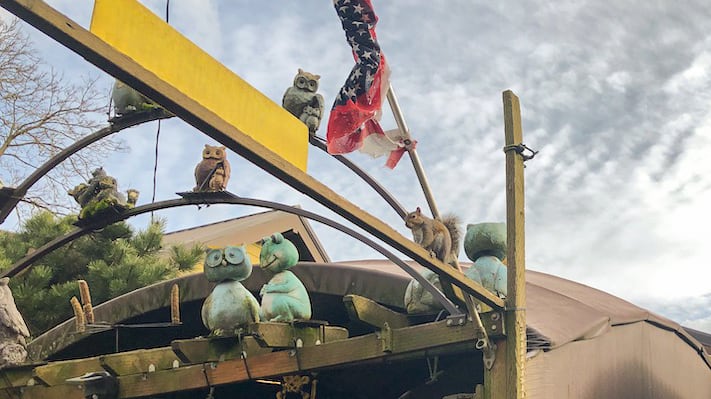Long before squirrel picnic tables became a pandemic lockdown fad, Dave Beck was serving regular breakfasts, lunches and dinners to the critters living in and around his property.
Really, you could say that the lifelong Overlook resident’s entire yard is a giant squirrel picnic. Bright yellow signs mark the way to the Squirrel Highway he’s created—an impressive network of feeders, bridges and houses sprawling across the large corner lot, vying for space with metal sculptures.
“Twenty-five, 30 years ago, I used to leave seed out for the birds,” says Beck, a semi-retired financial analyst. “Then I noticed the squirrels were eating it too because they were so hungry. So I started feeding them walnuts and hazelnuts.”
Beck’s filbert supply comes from a grower in Newberg, which is where he got the inspiration to install signs stamped with nut puns around his house after seeing similar displays at the farm’s office. One reads “Welcome to the Nut House,” while another states that “Squirrels are like fudge: mostly sweet with a few nuts!” There’s even a sign belting out (use your best Mötley Crüe voice) “SQUIRRELS/SQUIRRELS/SQUIRRELS.”
The overall effect of this exhibit, which hangs from trees and dangles from utility lines that connect to Beck’s home, is chaotic and whimsical. And it definitely causes passersby to stop in their tracks and take photos. Beck says kids, in particular, like to hang around and watch squirrels run from feeder to feeder.
However, not everyone in the neighborhood finds the bushy-tailed rodents a delightful distraction. Right at the property line, precisely where the Squirrel Highway begins, there are squirrel-repelling spikes attached to the fence top. Beck says those particular neighbors don’t want the animals digging in their garden beds and burying nuts. And, of course, he’s heard some people refer to squirrels as “rats with furry tails.”
Squirrels can carry disease and disease-spreading parasites. According to the Oregon Department of Fish and Wildlife’s squirrel fact sheet, that includes ringworm and rabies, but the agency also notes that “there is minimal documentation of disease transmission from tree squirrels to humans.”
Still, OFW and Portland Audubon do not recommend that you feed squirrels, in large part because it can habituate them to people. Beck agrees.
“It’s not a good idea to get these animals too friendly with humans,” he says. “Then they lose a bit of their distrust and they can get hit by a car.”
Squirrels aren’t the only animals that Beck tends to; he also provides food for stray cats. The Katnip Condo, a large shelter by the sidewalk in front of his property, looks more like a seedy motel thanks to the addition of signs that state there are “Weekly Rates” and “No minors allowed.” But the vibe is actually pretty chill. On a recent Sunday morning, a well-fed orange and white tabby emerged from the front door to rub up against Beck’s legs. He says the cats that show up tend to be abandoned pets left behind when their owners move away, and are accustomed to people.
The squirrels, though? Strictly wild animals.
“To me, they’re certainly not pets,” says Beck. “I think of them as just neighbors.”
